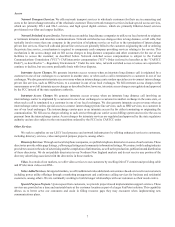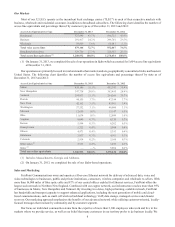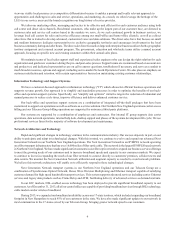FairPoint Communications 2013 Annual Report Download - page 18
Download and view the complete annual report
Please find page 18 of the 2013 FairPoint Communications annual report below. You can navigate through the pages in the report by either clicking on the pages listed below, or by using the keyword search tool below to find specific information within the annual report.16
The FCC's CAF/ICC Order significantly changes the existing rates for access charges, which, combined with the increase
in competition, have generally caused the aggregate amount of switched access charges paid by long distance carriers to decrease
over time. The FCC, in a separate proceeding, is considering whether to modify price cap rules as they apply to special access and
whether to restrict some of the pricing flexibility enjoyed by price cap ILECs, which includes some of our Northern New England
operations. We cannot predict what changes, if any, the FCC may eventually adopt and the effect that any of these changes may
have on our business.
Universal Service Regulation
Universal Service Fund Support. USF disbursements were distributed only to carriers that were designated as "eligible
telecommunications carriers" ("ETCs") by a state regulatory commission. All of our LECs were designated as ETCs. As previously
described, the FCC has replaced the legacy USF high-cost programs with its CAF programs.
We benefit indirectly from support to low-income users under the Lifeline and Linkup universal service programs. Effective
April 1, 2012, the Linkup program was eliminated for all low-income subscribers except for Native Americans. Linkup is a program
which pays 50% of the non-recurring charges, not to exceed $30.00 per month, associated with establishment of local
telecommunications service. Also effective April 1, 2012, there were major reforms to the Lifeline program. Prior to the changes,
Lifeline credits were based on four tiers of support. The first three tiers of federal support were replaced by a flat credit of $9.25
per month. The fourth tier, which relates to Native Americans, is unchanged. In addition, the FCC established revised eligibility
criteria effective April 1, 2012. The revised eligibility criteria established in 2012 resulted in a reduction in lines eligible for Lifeline
credits. The FCC order required the Universal Service Administration Company to establish a national database by the end of 2013
which will be used to eliminate duplicate funding. The construction of this database is in process and is being implemented in
phases. The elimination of duplicate support could result in fewer customers choosing us for Lifeline service, with the potential
that a portion of our Lifeline customers may prefer to use other carriers for this service.
Universal Service Contributions. Federal universal service programs are currently funded through a surcharge on interstate
and international end user telecommunications revenues. Declining long distance revenues, the popularity of service bundles that
include local and long distance services, and the growth in size of the fund, due primarily to increased funding to competitive
ETCs, all prompted the FCC to consider alternative means for collecting this funding. As an interim step, the FCC has ordered
that providers of certain VoIP services must contribute to federal universal service funding. The FCC also increased the percentage
of revenues subject to federal universal service contribution obligations that wireless providers may use as their methodology for
funding universal service. We cannot predict whether the FCC or Congress will require modification to any of the universal
contribution rules, or the ultimate impact that any such modification might have on us or our customers.
Local Service Competition
The 1996 Act provides, in general, for the removal of barriers to market entry in order to promote competition in the provision
of local telecommunications and information services. As a result, competition in our local exchange service areas will continue
to increase from CLECs, wireless providers, cable companies, Internet service providers, electric companies and other providers
of network services. Many of these competitors have a significant market presence and brand recognition, which could lead to
more competition and a greater challenge to our future revenue growth.
Under the 1996 Act, all LECs, including both ILECs and CLECs, are required to: (i) allow others to resell their services,
(ii) ensure that customers can keep their telephone numbers when changing carriers, referred to as local number portability,
(iii) ensure that competitors' customers can use the same number of digits when dialing and receive nondiscriminatory access to
telephone numbers, operator service, directory assistance and directory listing, (iv) ensure competitive access to telephone poles,
ducts, conduits and rights of way and (v) compensate competitors for the cost of completing calls to competitors' customers from
the other carrier's customers.
In addition to these obligations, ILECs are subject to additional requirements to: (i) interconnect their facilities and equipment
with any requesting telecommunications carrier at any technically feasible point, (ii) unbundle and provide nondiscriminatory
access to certain network elements, referred to as unbundled network elements ("UNEs"), including some types of local loops and
transport facilities, at regulated rates and on nondiscriminatory terms and conditions, to competing carriers that would be "impaired"
without them, (iii) offer their retail services for resale at wholesale rates, (iv) provide reasonable notice of changes in the information
necessary for transmission and routing of services over the ILEC's facilities or in the information necessary for interoperability
and (v) provide, at rates, terms and conditions that are just, reasonable and nondiscriminatory, for the physical co-location of
equipment necessary for interconnection or access to UNEs at the ILEC's premises. Competitors are required to compensate the
ILEC for the cost of providing these services.
Our non-rural operations are subject to all of the above requirements. In addition, our non-rural operations are subject to
additional unbundling obligations that apply only to Bell Operating Companies. In contrast to the unbundling obligations that
























